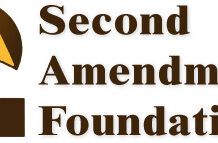
I was disappointed to see that on June 26, the U.S. Supreme Court decided not to hear Peruta v. California. A Supreme Court decision would have answered some important legal questions: Does the Second Amendment’s coverage for people to keep and bear arms extend outside the home? Does it cover the right to carry concealed firearms in public? Peruta might have provided definitive legal answers to those questions. Gun owners already know the answers, so we’re frustrated that a natural right to self protection is hemmed in by state statutes.
Edward Peruta is the named appellant in the case, which was brought on behalf of the California Rifle and Pistol Association (CRPA) Foundation and five individuals who were denied carry licenses by the San Diego Sheriff William D. Gore. In February 2014, a three-judge panel of the Ninth Circuit hearing Peruta resulted in a monumental ruling that held that the San Diego County sheriff’s policy of refusing to issue licenses to carry firearms in public—unless an applicant could demonstrate a special need—was an unconstitutional violation of the Second Amendment. Basically, Peruta struck down the “good cause” requirement that many states use for allowing someone to carry a concealed firearm in public. What didn’t count as a “good cause” was one’s personal safety—unbelievable.
Then the decision was reversed in June 2016 when an 11-judge en banc panel of the Ninth Circuit found that the Second Amendment offers no protection for gun owners. The majority wrote, “Because the Second Amendment does not protect in any degree the right to carry concealed firearms in public, any prohibition or restriction a state may choose to impose on concealed carry—including a requirement of ‘good cause,’ however defined—is necessarily allowed by the Amendment.”
That is the decision that will stand now that the Supreme Court has declined to hear the case.
In a dissent to the decision to deny the hearing (certiorari), Justices Thomas and Gorsuch said, “We should have granted certiorari in this case. The approach taken by the en banc court is indefensible, and the petition raises important questions that this Court should address. I see no reason to await another case. The en banc court’s decision to limit its review to whether the Second Amendment protects the right to concealed carry—as opposed to the more general right to public carry—was untenable. Most fundamentally, it was not justified by the terms of the complaint, which called into question the State’s regulatory scheme as a whole.”
Then, further: “The Court’s decision to deny certiorari in this case reflects a distressing trend: the treatment of the Second Amendment as a disfavored right… The Constitution does not rank certain rights above others, and I do not think this Court should impose such a hierarchy by selectively enforcing its preferred rights.”




























